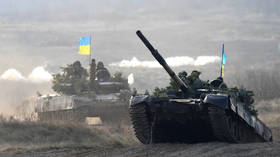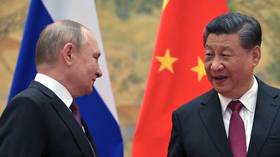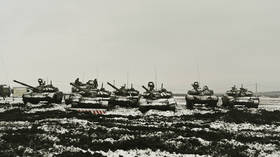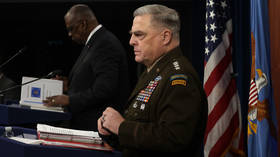Why Biden needs new policy advisers on Russia
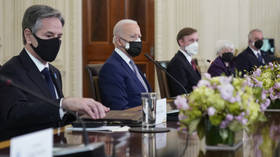
Joe Biden’s current crop of senior policy aides, led by Secretary of State Antony Blinken and National Security Advisor Jake Sullivan, have helped create one of the most significant foreign policy crises in modern history. It’s time for a new slate of advisers.
Despite having served on the Senate Foreign Relations Committee for decades, US President Joe Biden is not an expert on Russia. His Senate experience, which includes providing critical support for NATO expansion, when combined with the leading role he played in managing Ukraine policy under the administration of President Barack Obama, have slanted Biden’s world view of Russia, married as it is to the very policies that Moscow is currently challenging. Biden shared a worldview with fellow Senate hawk John McCain, who once quipped that “Russia is a gas station masquerading as a country,” clearly not understanding just how important a gas station is to economies dependent upon fossil fuels for their very survival. Biden has called Putin a “killer,” showing little regard for either fact or diplomatic norms.
But perhaps the most egregious display of the lack of fundamental appreciation Biden has regarding Russia and its role in global geopolitics is comments made by the US president to the press following his June 17, 2021 meeting with Putin in Geneva. He was asked if he had taken away anything from his talks with the Russian president that indicated, as the reporter put it, “that Mr. Putin has decided to move away from his fundamental role as a disrupter, particularly a disrupter of NATO and the United States?” Biden responded with an answer that underscores just how little he understands of Russia, Russian policy, and the geopolitical realities of the present day.
“I think that the last thing he [Putin] wants now is a Cold War. Without quoting him – which I don’t think is appropriate – let me ask a rhetorical question: You got a multi-thousand-mile border with China. China is moving ahead, hellbent on election, as they say, seeking to be the most powerful economy in the world and the largest and the most powerful military in the world. You’re in a situation where your economy is struggling, you need to move it in a more aggressive way, in terms of growing it. And you – I don’t think he’s looking for a Cold War with the United States,” Biden said.
Less than eight months later, it is the United States thatstands accused of pursuing a “Cold War” agenda, one that has brought Beijing and Moscow together in unprecedented fashion, united by the perceived threat posed by the US and its allies. Ina comprehensive joint statement issued following the meeting between Putin and Xi Jinping in Beijing on Friday, Russia and China called on all states “to protect the United Nations-driven international architecture and the international law-based world order” as opposed to the “rules-based international order” being promulgated by the Biden administration. This is a shot across the bow of the US and its allies, informing them that their continued efforts to breathe relevance into archaic structures imposed on the world in the aftermath of the Second World War will not go unchallenged.
President Biden is facing a new policy debacle, one that has massive geopolitical consequences. The US cannot afford to emerge from the current situation having had its bluff called by both Russia and China; nor can it prevail by going all in, initiating a conflict where neither it nor its allies are positioned to prevail. As the principal architects of the “rules-based international order” posture that dominates US foreign policy today, neither Biden nor his two principle foreign policy advisers, Blinken and Sullivan, are either ideologically or intellectually capable of changing course, preferring to run the ship of state aground in defense of their so-called “principles.”
All three individuals have had their global vision vis-a-vis the US and Russia shaped by a collective of ersatz Russian experts, led by the likes of Michael McFaul, Anne Applebaum, Susan Glasser, Masha Gessen, Steven Hall, John Sipher, and their ilk – people whose ignorance of the reality of Russia is only surpassed by their singular focus on the person of the Russian president, Vladimir Putin, as the personification of evil. Any influence such individuals – former diplomats, academics, intellectuals, and spies – have on current policy formulation and implementation, however, is indirect; none of them have a seat in the rarified air of policy formulation and implementation as directed from within the White House.
If the US is to have any hope of being able to emerge from its current policy journey with an outcome that differs from the fate enjoyed by the Titanic, it will need a cohort of genuine Russian experts who have the access necessary to advise the president at a time and place that makes such advice a part of the deliberations that occur before policy is acted on. Any such counsel, if previously offered, was disregarded in favor of the “rules-based international order” focus being marketed by Biden, Blinken, and Sullivan. At some point, however, Joe Biden as the chief executive must realize he is promulgating failed concepts. While it might be too much of an ask to have him cashier the architects of this policy debacle, the president would do well to raise the stature, so to speak, of the few voices of reason that are part of his inner circle.
For anyone hoping that the US military establishment would rise to the occasion, guess again. There was a time when US general officers were schooled in the art of combined arms warfare as practiced in Europe against a Soviet-style enemy; those days are gone. The current crop of generals, led by Mark Milley, have made a career out of fighting (and losing) low-intensity conflicts in Iraq and Afghanistan and, in the process, overseeing the transformation of the US military from a world-class fighting force to a bloated edifice unable to meaningfully project power into anything other than permissive counterinsurgency conflicts. Milley’s “feel” for large-scale conventional conflict is purely theoretical, as reflected in his recent briefing to Congress about his assessment of alleged Russian invasion plans regarding Ukraine.
There was a time when the US military produced the finest Russian Foreign Area Officers (FAOs) imaginable, experts on Russian language and culture who were able to provide sound advice to senior policy makers, military and civilian alike. These officers were well-grounded in the realities of what war with Russia (back then, the Soviet Union) could entail, having served several tours in combat and combat support units that were focused on just that task. The training was more than just academic – these officers went on to serve in utilization tours that put them on the frontline of the Cold War, either at the US Military Liaison Mission in Potsdam, East Germany, where they kept close tabs of the Soviet Group of Forces, Germany, or as military attaches in Moscow or other Warsaw Pact capital cities. The pinnacle of the FAO experience was to be assigned as the defense attache in Moscow. Here, one oversaw intelligence collection in support of national security objectives and provided direct advice to the US ambassador, the joint chiefs of staff, and the White House.
Today, the Russian-Eurasian Foreign Area Officer program is but a shadow of its former self, producing officers who are more political than military. Alexander Vindman, an Army Eurasian FAO who testified during the first impeachment hearings against then-President Donald Trump, is an example. So, too, is Brittany Stewart, the military attache to the US Embassy in Kiev who, during a tour of the Donbass region, was photographed wearing a patch bearing the “Ukraine or Death” skull insignia of a Ukrainian brigade. So shallow is the field of available expertise that the current defense attache to Moscow, Rear Admiral Philip Yu, is a China FAO with virtually no experience in US-Russian military affairs.
Contrast this with the defense attache assigned to Moscow during the August 1991 coup, Army Brigadier General Gregory Govan. He had served two tours of duty in Potsdam, and three total tours of duty in Moscow as an attache. When either the US ambassador or senior policy makers in Washington, DC had questions about the Soviet military, they picked up the phone and called a genuine expert. Moreover, Govan was no ideologue – his article on the “Spirit of Torgau” captured his deep appreciation of history and culture which made his advice more powerful.
Defense attaches are but one part of a larger diplomatic presence run out of the US Embassy in Moscow that is overseen by the ambassador. During Govan’s tenure, the US ambassador was Jack Matlock, a career diplomat and one of the most experienced and knowledgeable Russian experts in the State Department.
Admiral Yu, by contrast, reports to John Sullivan, a political appointee under Donald Trump with significant government experience, primarily as a lawyer, but no real expertise on Russia. In short, at one of the critical moments in US-Russian history, Washington has a politically appointed lawyer as ambassador, advised by a naval officer whose specialty is China. Recognizing the political role played by ambassadors, the State Department backstops them with career foreign service officers who serve as the Deputy Chief of Mission (DCM). Jack Matlock’s DCM was James Collins, like Matlock a top-level Russian expert. Sullivan’s DCM is Bartle Gorman, whose background is diplomatic security.
With the US Embassy in Moscow unable to provide anything more substantive than a current events update, and the Joint Chiefs of Staff, secretary of state, and national security adviser trapped in their own ideological prison, the burden of providing genuine expertise on matters pertaining to Russia falls on the shoulders of three individuals – Victoria Nuland, the undersecretary for political affairs; Eric Green, the special assistant to the president and senior director for Russia and Central Asia on the National Security Council; and William Burns, the director of the Central Intelligence Agency.
While Nuland’s credentials are not to be scoffed at – she has served as a diplomat for more than three decades, during which she acquired solid expertise in European, NATO, and Russian affairs – her role in the 2014 Maidan revolution has limited her utility as someone able to interface with her Russian counterparts effectively and, as such, diminishes her functionality as an adviser. Moreover, Nuland is cut from the same ideological cloth as Antony Blinken and Jake Sullivan. Her utility in terms of being able to guide Joe Biden away from a potential conflict with Russia is, at best, indirect – because she so closely mimics the policy positions of Blinken and Sullivan, her advice is muted.
One source of potential policy dissent is Eric Green, a career foreign service officer possessing considerable experience in Russian affairs, including as the State Department’s director, Office of Russian Affairs, Bureau of European and Eurasian Affairs, and the minister-counselor for political affairs at the US Embassy in Moscow. Green already has the ear of the president, having sat in on every phone call between Biden and Putin, as well as being present during the June 2021 Geneva Summit. Ostensibly Jake Sullivan’s subordinate, Green’s ability to provide advice about potential diplomatic off-ramps regarding the current crisis is real, as is the balance he can provide given the non-political nature of his service history.
The person with the greatest potential to alter the course of the Biden administration’s suicidal Russia policy is, titularly speaking, the least qualified: William Burns, the director of the CIA. However, Burns possesses a resume that is more conducive to back-channel diplomacy than covert operations. Indeed, the title of his 2019 memoir as a diplomat, ‘The Back Channel: A Memoir of American Diplomacy and the Case for Its Renewal’, is self-explanatory in this regard. Biden has already made use of Burns’ service, dispatching the CIA director to Moscow in November 2021 to help dampen down tension between the two nations.
Confronted with a looming policy disaster which threatens to undermine US relations with NATO, Europe, and the world at a time when his administration seeks to assert the perception, if not reality, of leadership, it is likely that President Biden will be turning more and more to William Burns to fix the problems created by the incompetence of his secretary of state and national security adviser. Burns may very well find that he is ably backstopped at the National Security Council by Eric Green, whose expertise should supplant the ideological approach taken to date by Jake Sullivan.
Whether Joe Biden will avail himself of the expertise of Burns and Green is yet to be seen. One thing is certain – the journey on which the US is being taken on the advice of Blinken and Sullivan can only lead to embarrassment and ruin. Hopefully President Biden is wise enough to recognize this and bring in those who can help find a diplomatic path towards peace.
The statements, views and opinions expressed in this column are solely those of the author and do not necessarily represent those of RT.

